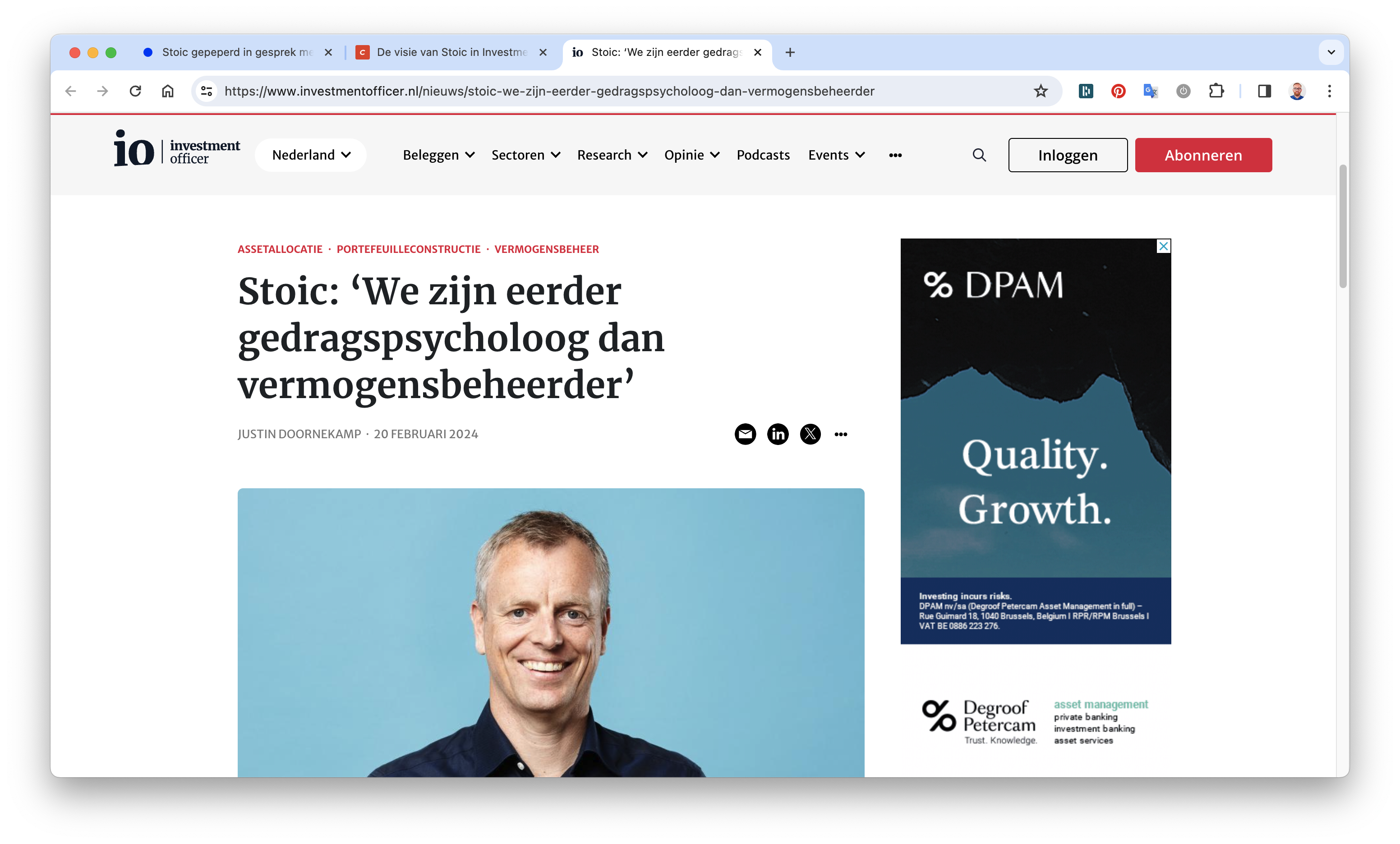The asset management website Investment Officer (formerly Fondsnieuws) spoke with Stoic partner Freddy Forger about Stoic's role as a supervisor of our clients' money. You can read that article, written by Justin Doornekamp, here. If you don't have an Investment Officer subscription, you can read a full copy of the article below.
To find happiness, humans must free themselves from emotions. This ancient Greek stoic philosophy forms the basis of what Stoic, based in Amsterdam, strives to do: protect clients from their own emotions. "We are more behavioral psychologists than asset managers."
History has shown that economic developments and stock prices are impossible to predict. According to Freddy Forger, founder and partner at Stoic, there's little point in having a comprehensive investment vision. "We invest without vision, and there's only one way to do that, and that's to buy every company," Forger explained in an interview with the Investment Officer. The MSCI All Country World IMI Index forms the basis of Stoic's investment portfolios. The CEO calls many other investment products "great for the industry, but not for the client."
Three-quarters of Stoic's assets under management are in equities, the remainder primarily in German and Dutch government bonds. The bonds are primarily offered to clients who want to access their assets in the short to medium term; for long-term investors, the asset manager recommends equities. Forger: "I've always considered the 60/40 portfolio a strange split. A portfolio's allocation should reflect the client's current thinking about when funds will be needed for other purposes. If it's longer than ten years, they should opt for equities; if it's shorter, then the best choice, in my view, is bonds that mature when the investor needs the money."
Forger considers terms like offensive, neutral, and defensive too emotionally charged, which is why he opted for profiles like Stoic 100, Stoic 70, or Stoic 40. The figure indicates the percentage of the portfolio held by equities. "That makes it clearer for the client."Remaining Stoic
A few ETFs to track the entire market: it sounds so simple. Why doesn't the investor buy their own ETFs? Forger: "As the amounts increase, the question arises to what extent an investor can remain stoic. We're bombarded with news every second, and the temptation to act on it is strong. By having the money invested, an investor can protect themselves from their own emotions. After all, who can ensure that if they lose their job, they don't liquidate their entire portfolio in a fit of emotion? It sounds easy to do it yourself, and in principle it is, but staying away from it for thirty years is extremely difficult. We're actually paid because we're better off doing nothing than our clients."
Moreover, an incorrect order on an execution-only platform is easily made. "When dealing with large sums of money, you might prefer to place that responsibility with your asset manager. And it's not a bad idea to pay a small fee for that."
The formula seems to be working. Stoic saw its assets under management grow from €100 million in 2018 to €1.5 billion in 2024. The asset manager hopes to surpass €2 billion by the end of the year.
Client-centricity is a challenge
It's also the emotional aspect among investors that remains a challenge for further growth of Stoic's assets under management, says Forger. "We've been outperforming the average asset manager for twelve years, sometimes by just a percentage point, but it can involve large sums of money. Yet, that's not always enough to convince clients to switch."
"Many companies often employ incredibly nice people. Just try leaving them. The average asset manager's strength lies in building and maintaining relationships with clients. With us, the client is not the central focus, because emotions can hinder rational processes, and thus their returns. We constantly try to make that clear. In that respect, we are sometimes more of a behavioral psychologist than an asset manager."
© Investment Officer 2024.


